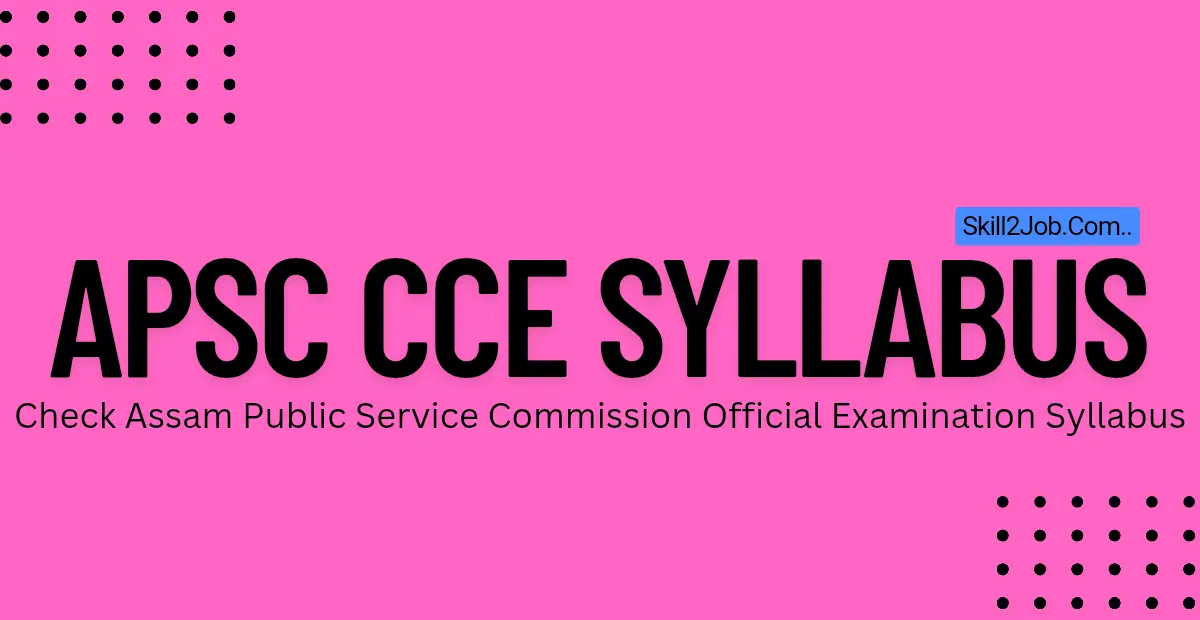Crack APSC CCE 2025 with a complete guide on the syllabus, Prelims & Mains exam pattern, subject-wise topics, and the selection process.

The Assam Public Service Commission (APSC) is a constitutional authority tasked with selecting eligible candidates for key administrative roles in the state. It oversees multiple recruitment exams, ensuring transparency and merit-based selection for various government positions.
Among its exams, the Combined Competitive Examination (CCE) stands out as the most sought-after, serving as the gateway to prestigious services like the Assam Civil Service and Assam Police Service. This guide provides a detailed overview of the APSC CCE syllabus and exam structure, helping aspirants navigate their preparation effectively.
APSC Syllabus Overview
| Organization |
Assam Public Service Commission (APSC) |
| Exam Name |
Combined Competitive Examination (CCE) |
| Job Role |
Grade A and B |
| Job Location |
Assam |
| Job Type |
Government (Permanent) |
| Stages |
Preliminary, Mains, Interview |
| Preliminary Exam Papers |
Paper I and II |
| Mode of Exam |
Offline (OMR-based) |
| Negative Marking |
0.25 |
| Eligibility |
Graduate and Above |
| Age Limit |
21 – 38 years |
| Salary |
Varies by Post |
| Official Website |
apsc.nic.in |
APSC CCE Selection Criteria
The Assam Public Service Commission (APSC) conducts the Combined Competitive Examination (CCE) to recruit candidates for various administrative positions in the state. The selection process is designed to assess candidates’ knowledge, analytical abilities, and overall suitability for civil service roles. It comprises three rigorous stages that test different aspects of a candidate’s competence.
1. Preliminary Exam – An objective-type screening test that filters candidates for the Mains examination.
2. Mains Exam – A descriptive written examination that evaluates subject expertise, analytical thinking, and writing skills.
3. Interview/Viva Voce – The final stage, where candidates are assessed on personality, communication skills, and decision-making abilities.
1. Preliminary Examination
The APSC CCE Preliminary Exam serves as a screening test, consisting of objective-type multiple-choice questions to evaluate candidates’ general awareness, reasoning, and analytical skills.
General Studies I
| Exam Name |
CCE Prelims |
| Paper |
GS - Paper I |
| Total Marks |
200 Marks |
| Total Questions |
100 Questions |
| Duration |
Two Hours |
| Syllabus Topics |
- Current events of national and international importance.
- History of India and Indian National Movement.
- Indian and World Geography - Physical, Social, Economic Geography of India and the World.
- Indian Polity and Governance - Constitution, Political System, Panchayati Raj, Public Policy, Rights issues, etc.
- Economic and Social Development - Sustainable Development, Poverty, Inclusion, Demographics, Social Sector Initiatives, etc.
- General issues on Environment, Ecology, Bio-Diversity, and Climate Change – that do not require subject specialization.
- General Science.
|
| Special Note |
30-35% questions will be related to Assam. |
General Studies II
| Exam Name |
CCE Prelims |
| Paper |
GS – Paper II |
| Total Marks |
200 Marks |
| Total Questions |
80 Questions |
| Duration |
Two Hours |
| Syllabus Topics |
- Comprehension
- Interpersonal skills including communication skills
- Logical reasoning and analytical ability
- Decision making and problem solving
- General mental ability
- Basic numeracy (numbers and their relations, orders of magnitude, etc.) (Class X level)
- Data Interpretation (charts, graphs, tables, data sufficiency, etc.) (Class X level)
|
APSC Prelims Syllabus and Questions Paper
Exam Cities
| Amingaon |
Barpeta |
Bongaigaon |
Biswanath Chariali |
| Dhemaji |
Dhubri |
Dibrugarh |
Diphu |
| Goalpara |
Golaghat |
Guwahati |
Haflong |
| Hailakandi |
Hamren |
Hatsingimari |
Hojai |
| Jorhat |
Kajalgaon |
Kokrajhar |
Majuli |
| Mangaldoi |
Morigaon |
Mushalpur |
Nagaon |
| Nalbari |
North Lakhimpur |
Silchar |
Sivasagar |
| Sonari |
Sribhumi |
Tamulpur |
Tezpur |
| Tinsukia |
Udalguri |
|
|
2. Main Examination (Written and Interview)
Candidates who clear the Preliminary Examination move on to the Main Examination, which consists of a written test followed by an interview.
(A) Written Examination
Selection Ratio: Candidates are shortlisted at a ratio of 11-12 times the total vacancies (category-wise).
Number of Papers: Six (Essay and General Studies).
Duration: 3 hours per paper.
Total Marks: 250 marks for each paper.
Medium of Examination: Candidates can choose to write in English or Assamese.
Exam Center: Conducted exclusively in Guwahati.
APSC Mains Syllabus
(B)
Interview Test
The final stage of the APSC CCE selection process is the Interview Test, designed to assess candidates' personality, decision-making skills, and overall suitability for civil service roles.
Selection Ratio: Candidates shortlisted at a 1:3 ratio per vacancy.
Total Marks: 180 marks.
Assessment Focus: Evaluates mental alertness, critical thinking, logical reasoning, judgment, leadership skills, social adaptability, and intellectual integrity.
Interview Format: A structured yet conversational interaction, emphasizing a candidate’s reasoning and perspective rather than a rigid cross-examination.
Important Note: No minimum qualifying marks are required; interview scores are added to the written exam marks for final merit ranking.
3. Final Selection & Merit Ranking
APSC follows a transparent and merit-based selection process for final recruitment. After completing both the written examination and interview, the Commission compiles each candidate’s total score by adding marks from the six written papers (1,500 marks) and the interview (180 marks), making a total of 1,680 marks.
The final merit list is prepared based on three key factors:
1. Overall Merit Rank – Determined by combined scores.
2. Service Preferences – Candidates are allotted services based on their choices.
3. Reservation Policies – Ensures fair representation as per government norms.
APSC maintains strict transparency, recommending only the exact number of candidates as vacancies notified. Additionally, no candidate is assigned a post they did not opt for, ensuring that the selection process respects candidates’ career aspirations while maintaining integrity and fairness.
Important Weblinks
